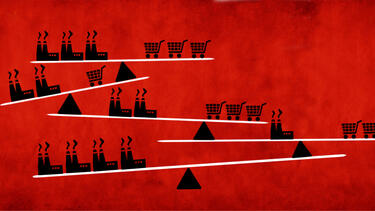Faculty Viewpoints
What Should We Understand about Urbanization in China?
The scale of urbanization in China is without precedent in human history. The transformation is also complex and nuanced, says Yale’s Karen Seto, with cities taking different approaches to environmental issues, pace of development, and global connections.

What’s Ahead for Financial Markets? An Interview with Robert Shiller
Nobel laureate Robert Shiller discusses some of the trends he currently sees in finance and the housing market.

Why Do We Need Experts?
Today’s political and cultural debates reflect a lack of consensus not just on policy but on the facts themselves—and on who is qualified to judge the truth. Robert C. Post, the dean of Yale Law School, argues for an approach to free speech that preserves the role of expertise.
Merkel’s Almost-But-Not-Quite-Decisive Victory Is Bad News for the Eurozone
With Germany at the center of the Euro crisis, the country’s recent national election has the potential to affect what happens far beyond its borders. Professor David Bach, Yale SOM's senior associate dean, teases out the implications of Angela Merkel’s big—but maybe not big enough—win.
Where Will China Go Next?
China faces an immense challenge: it needs to continue growing its economy while shifting away from the manufacturing-led model that has fueled its growth in recent decades. At the same time, it has to address concerns over pollution, income inequality, and other social issues. Yale’s Stephen Roach argues that the rest of the global economy has a stake in whether China can successfully shift gears.

China's business landscape
China’s remarkable economic expansion has cooled recently, but it remains a fast-growing and fast-changing marketplace. Yale China expert Deborah Davis gives a sociologist’s view of the cultural environment in which Chinese enterprises and entrepreneurs compete.
Why You Buy What You Buy
Professor Ravi Dhar runs through how recent research in psychology helps explain how we all make decisions when shopping. When are you impulsive? When do you really think things through? When do you make the good long-term choice? And when do you go for the junk food?

How Dangerous Is America?
In the Boston Globe Magazine, Professor Edward Kaplan writes that although more Americans report being worried about terror attacks, we are safer than we often feel. He cites his research that estimated the number of hidden terror plots being planned in the U.S. at any given time.
Can effective leadership make us healthier and wealthier?
Poor healthcare can do more than degrade quality of life; it can have a negative impact on a country's economic well-being. Elizabeth Bradley, professor of public health and director of the Yale Global Health Initiative, argues that when leaders make choices to improve public health they can foster virtuous cycles improving both health and economics. She also discusses the challenges facing China, the world's most populous nation, as it seeks to improve its healthcare system.
Robert Shiller: Owning a Home Isn’t Always a Virtue
In the New York Times, Professor Robert Shiller writes that the United States should reduce government subsidies for homeownership, while finding another way to promote household saving.